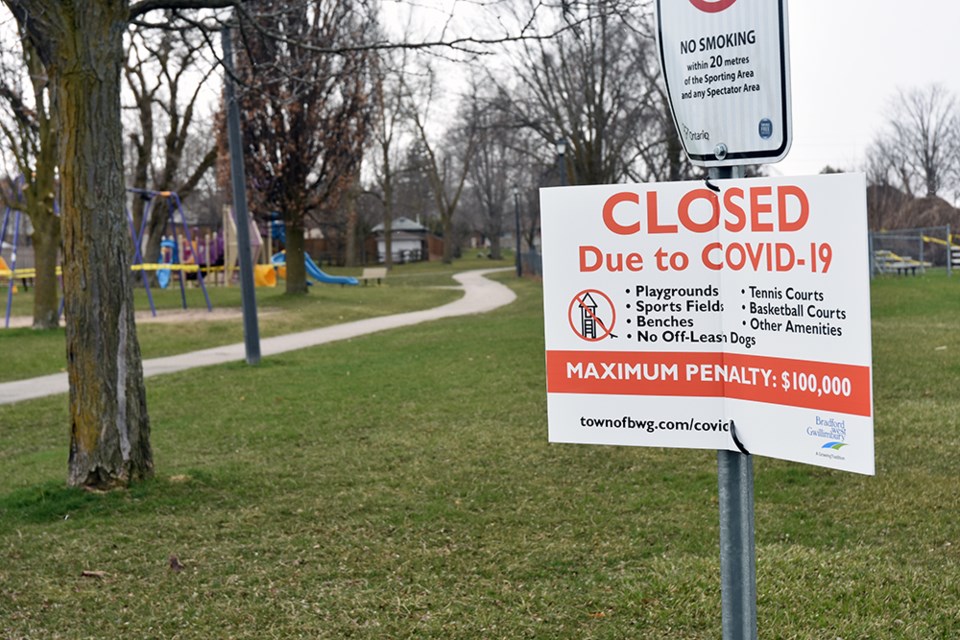In the BWG town council meeting on Tuesday, a third COVID-19 Financial Impact report was received by council for information purposes.
From extending property tax payment deadlines, to the COVID-19 emergency relief grant for small businesses, the town has stepped up to help its residents get through the crisis.
The most recent report focused on the 2020 Operating Budget implications of the Pandemic - outlining three different scenarios for year end, based on estimated loss of revenues balanced by mitigated costs and savings as a result of layoffs, deferred full-time and part-time hires, and use of available stabilization reserves.
The first scenario assumes all town operations and programs start up on Sept. 1 with a return to 50 percent of normal revenues.
Scenario 2 assumes the same Sept. 1 start-up, but a return to 75 percent of normal revenues - the "best case" scenario.
The third scenario, the "worst case", assumes all programs and operations will remain closed until the end of 2020.
In the "best case", the town would see year-end operating surpluses of $418,577 on the property taxes, $190,870 in wastewater, and $111,777 for water.
The "worst case" would see a wastewater surplus of $168,469, water surplus of only $16,773 - and an overall tax deficit of $168,671.
The staff report noted that council has already deferred $11.7 million in Capital works, and the pressure on the budget has further been eased by deferring hiring full-time replacement staff as well as seasonal, co-op and part-time help - a saving of $387,181.
The town has also laid off at least 175 part-time workers, "an unfortunate but necessary action to mitigate the impact of the leisure centre closure."
Other staff have been redeployed to fulfil duties that would have been looked after by seasonal staff positions.
“It’s always tough,” said Deputy Mayor James Leduc, noting the difficult decisions made by the town in these unprecedented times.
“Our staff did a great job mitigating some of the costs," Leduc said - as well as "reducing expenses as much as possible." The report estimated that the savings from not providing programs will come to over $1.3 million.
"We looked at all sorts of scenarios, and our CAO put some good numbers on the table. Worst case scenario, we’re at a minor deficit,” said the Deputy Mayor. “We might be in a little better shape than some others (municipalities).”
He noted that “we’re all suffering,” as municipalities. "We all need some financial help from our federal/provincial governments."
Leduc added, “We have a forecast we can hopefully work with and not be too hard on our residents in the future. I can assure our residents we’ve done our best to mitigate expenses and tighten our belts as much as possible.”
Chief Administrative Officer for the town, Geoff McKnight acknowledged that although the town has not been able to generate revenue from its programs and facilities since mid-March, due to the Provincially-mandated shutdowns, staff has been able to curtail costs associated with the facilities.
“There are discretionary costs, and those are what we were able to dial down on,” McKnight said, including the layoffs of part-time staff.
“Despite those efforts, there are still fixed costs, like insurance, hydro, gas and maintenance regardless if we offer programs. That’s why you’re still seeing fixed costs,” he explained. "Ultimately there are still some expenses."
“I think we will find ourselves somewhere in the middle with finances,” responded the Town's Director of Community Services, Terry Foran.
“As restrictions are lifted, we anticipate reduced numbers, but we have to assess what the staff cost will look like with restrictions,” he said. “It's a very complex conversation... We're navigating through a lot of these questions, step by step.”
Mayor Keffer thanked Foran for the information.
“Terry’s been a very busy person to keep on top of everything and keep our town operating. We’ve been operating very well,” said Keffer. “Thanks to the protocols put in place, staffing has been running smoothly."
He pointed out that grass cutting has resumed, and flowering baskets were recently hung up in the downtown core on Holland Street.
Staff has been doing a good job of keeping the town in "tip top shape and being there for our residents," Keffer said. "Worst case scenario, we will be in a deficit situation of $160-170,000 by the end of the year."
One of the biggest drains on the budget is transit, noted the mayor, suggesting, "The federal and provincial governments will hopefully step in and help us out."
He concluded, “I think it’s important this report came to council tonight to see where we’re at. The one thing we’ve known over the past two and a half months is that change happens very, very quickly, and we have to be nimble.”
The BWG library board is also going through similar reviews, and is confident that the library will be able to offset revenue shortfalls with effective cost-cutting measures, but their information was not included in the report.
Due to the deferral of property taxes and utility payment due dates, the town expects a lag in cash flow; already, arrears totals are higher than at the same time in 2019. Town staff will provide a more detailed update following the June 26 property tax due date and July 16 utility due date.
The full financial report can be found here.


